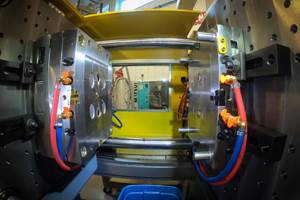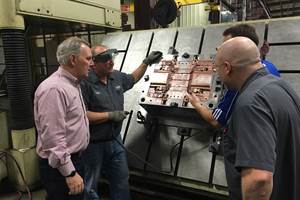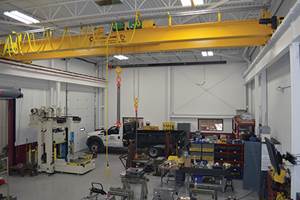The Critical Role of Management Representatives in ISO 9001
In ISO 9001 quality management systems, the Management Representative (MR) plays a crucial role. While the 2015 version of ISO 9001 no longer mandates this position, having a trusted management member serve as an MR remains vital for streamlining operations and maintaining quality standards.

Leadership. Direction. Coordination. Communication. Coaching. All of these terms describe the critical role of the Management Representative (MR) in an ISO 9001 quality management system. The MR acts as the eyes and ears of top management, monitoring the development and implementation of the quality management system (QMS) in a manufacturing facility. Their primary duties include:
- Ensuring QMS Implementation: The MR oversees the establishment, implementation and maintenance of all necessary QMS processes. They often take on the role of project manager for QMS design and implementation, coordinating with project teams and functional managers.
- Reporting Results: The MR reports on the QMS's effectiveness and the improvements that need to be made to top management. This involves distributing internal audit reports and facilitating management reviews.
- Promoting Awareness: The MR ensures that customer requirements are communicated throughout the organization, ensuring employees understand specifications relevant to their job responsibilities.
- Quality Liaison: The MR often serves as a point of contact with external parties on matters relating to the QMS, including coordinating customer audits.
Implementing the QMS
As a project manager for QMS design and implementation, the MR:
- Coordinates with project teams to define processes
- Provides or coordinates training on QMS processes
- Oversees document control for QMS documentation
- Coordinates internal audits to monitor QMS compliance and effectiveness
Reporting to Management
The MR's reporting duties typically include:
- Distributing internal audit reports
- Tracking resolution of open issues
- Facilitating management reviews
- Developing review agendas
- Coordinating result reporting
- Guiding discussions
- Suggesting QMS improvements
- Publishing review minutes
Ensuring Awareness of Customer Requirements
To promote awareness of customer requirements, the MR should:
- Identify explicit customer requirements (specifications, purchase orders, quality criteria)
- Consider implied requirements based on advertised promises
- Account for general business expectations (on-time delivery, accurate communications)
- Associate requirements with relevant employees
- Evaluate communication processes for maintaining awareness
Examples of communication processes include:
- Standard meeting agendas
- Specification routing sheets
- Approval processes
- Distribution lists
- Employee bulletins
- Procedure reviews
- Data charts showing performance against requirements
Qualities of an Effective MR
To excel in this role, an MR should possess:
- Strong knowledge of ISO 9001 requirements
- In-depth understanding of the company's operations and QMS
- Ability to listen and influence
- Effective communication and summarization skills
- Project management and organizational capabilities
The MR's Impact on Small Businesses
For small businesses seeking ISO 9001 certification, the MR plays a critical role in:
- Maintaining consistent quality output
- Enhancing productivity across the organization
- Demonstrating commitment to quality standards
- Gaining a competitive edge in the market
While the MR shoulders significant responsibilities, it's crucial to remember that top management remains accountable for the QMS. The MR should facilitate and coordinate rather than insulate top management from their quality-related duties.
Organizations can clearly define the MR's role and responsibilities to ensure more effective quality management and smoother ISO 9001 implementation. This can be a key factor for small businesses in achieving certification and strengthening their market position.
Remember, the journey to ISO 9001 certification doesn't have to be navigated alone. Consulting firms specializing in quality management can provide valuable expertise and guidance, helping businesses prepare for audits and achieve respected ISO certification. With the right support and a dedicated MR, even small businesses can demonstrate their commitment to quality and compete on a global scale.
For more information: 706-694-2977 / lewis.yasenchak@windstream.net
Related Content
Think Safety: Eliminate Hazards Throughout the Shop
The tooling community is taking advantage of new products for safer mold shops and molding facilities.
Read MorePredictive Manufacturing Moves Mold Builder into Advanced Medical Component Manufacturing
From a hot rod hobby, medical molds and shop performance to technology extremes, key relationships and a growth strategy, it’s obvious details matter at Eden Tool.
Read MoreOEE Monitoring System Addresses Root Cause of Machine Downtime
Unique sensor and patent-pending algorithm of the Amper machine analytics system measures current draw to quickly and inexpensively inform manufacturers which machines are down and why.
Read MoreThe Trifecta of Competitive Toolmaking
Process, technology and people form the foundations of the business philosophy in place at Eifel Mold & Engineering.
Read MoreRead Next
Creating an Effective Supplier Management Scorecard
Keeping Up with ISO columnist, Lewis Yasenchak wants to help moldmakers measure performance metrics across their supply chain with this quick-read. How often do you check your supplier management scorecard?
Read MoreHow To Get Your Team on Board with ISO 9001
ISO 9001 can simplify life for the business and the team. Here are 4 ways to sell this certification to gain your team's support.
Read MoreCertified Quality Management for Plastics Professionals – Materials to Tooling to Recycling
Why is certification of a shop’s quality management system to ISO 9001, AS9100, IATF 16949 or ISO 13485 so special? What does the certification signify? And what supports the paper behind the framed certificate?
Read More






.jpg;maxWidth=300;quality=90)














